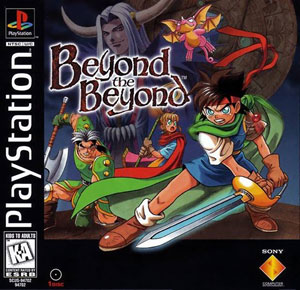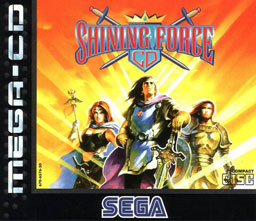 W
WBeyond the Beyond, known in Japan as Beyond the Beyond: Harukanaru Kanān e , is a role-playing video game that was developed by Camelot Software Planning and published by Sony Computer Entertainment for the PlayStation in 1995. Though not the first role-playing game released for the PlayStation, Beyond the Beyond was the first RPG available in the west for the console using a traditional Japanese RPG gameplay style like Final Fantasy, Dragon Quest and Phantasy Star. The characters were designed by popular manga artist Ami Shibata.
 W
WEverybody's Golf, known in Japan as Minna no Golf, is the first game in the Everybody's Golf series. The North American release was renamed Hot Shots Golf. It was the only game in the series to be developed by Camelot Software Planning, which later developed the Mario Golf series.
 W
WMario Golf is a 1999 sports game developed by Camelot Software Planning and published by Nintendo for the Nintendo 64. Mario, his friends, and his enemies play golf on a variety of Mario-themed courses. Following NES Open Tournament Golf, it is the second game in the Mario Golf series.
 W
WMario Golf: Advance Tour is a role-playing video game-styled sports game developed by Camelot Software Planning and published by Nintendo for the Game Boy Advance in 2004. The game is the sequel to the Game Boy Color version of Mario Golf and the Game Boy Advance counterpart of Mario Golf: Toadstool Tour.
 W
WMario Golf: Super Rush is a golf video game developed by Camelot Software Planning and published by Nintendo for the Nintendo Switch console. It is the sixth installment in the Mario Golf series following Mario Golf: World Tour in 2014 and is part of the larger Mario franchise. The game features various characters from the Mario franchise competing in golf, with regular competition and other modes. Mario Golf: Super Rush was announced via a Nintendo Direct on February 17, 2021 and was released worldwide on June 25, 2021. It received mixed reviews from critics who praised the gameplay mechanics, new modes, controls, and visuals, but criticism was directed at the game's low amount of content at launch, while the adventure mode also received a mixed reaction.
 W
WMario Golf: Toadstool Tour, known in Japan as Mario Golf: Family Tour , is a 2003 sports game developed by Camelot Software Planning and published by Nintendo for the GameCube. It is the sequel to the 1999 Nintendo 64 title Mario Golf, and is the third game in the Mario Golf series. It was released in North America on July 28, 2003, in Japan on September 5, 2003, and in PAL regions in 2004.
 W
WMario Golf: World Tour is a golf video game developed by Camelot Software Planning and published by Nintendo for the Nintendo 3DS. The game was first announced on February 14, 2013, in a Nintendo Direct presentation. It is the fifth game in the series, and is the first one in a decade, since 2004's Mario Golf: Advance Tour for the Game Boy Advance. The game was initially scheduled for the second half of 2013, but was eventually delayed to May 2014. It was released worldwide in May 2014.
 W
WMario Power Tennis, is a sports game developed by Camelot Software Planning and published by Nintendo. The game is the sequel to the Nintendo 64 title Mario Tennis, and is the fourth game in the Mario Tennis series. Power Tennis was released for the GameCube in Japan and North America in late 2004, and in PAL regions in early 2005. The game was ported for the Wii in 2009 as part of the New Play Control! series, and was also re-released as a Nintendo Selects title in 2012. A companion handheld game, Mario Tennis: Power Tour, was also released on Game Boy Advance around the same time as the original GameCube release, bearing the same title as Power Tennis in Europe.
 W
WMario Sports Superstars is a sports video game developed by Bandai Namco Studios and Camelot Software Planning and published by Nintendo for the Nintendo 3DS handheld video game console. The game contains five sports minigames, football, baseball, tennis, golf, and horse racing, and was released worldwide in March 2017.
 W
WMario Tennis is a sports video game developed by Camelot Software Planning and published by Nintendo for the Nintendo 64 video game console. The game was released in North America and Japan in the summer of 2000, and released in Europe later in November. It is the first tennis-based game starring Mario since Mario's Tennis, and the second game developed by Camelot on a Nintendo system. The game is known for being the introduction of Luigi's arch-rival, Waluigi, and the re-introduction of Princess Daisy and Birdo. A Game Boy Color version, also developed by Camelot and Nintendo, was published under the same title in Western regions and as Mario Tennis GB in Japan. The Game Boy Color version was released on November 1, 2000, in Japan; January 16, 2001, in North America; and February 2, 2001, in Europe.
 W
WMario Tennis Aces is a tennis game developed by Camelot Software Planning and published by Nintendo for the Nintendo Switch. Part of the Mario Tennis series, it was released worldwide on June 22, 2018. The game sold over 3 million copies by the end of 2019, making it one of the best-selling games on the Switch.
 W
WMario Tennis Open is a Mario sports game developed by Camelot Software Planning and published by Nintendo for the Nintendo 3DS. The game was developed by Camelot, which has produced most of the previous Mario Tennis titles. The game was first released on May 20, 2012 in North America and in other regions the same month. It was later released as a downloadable title on the Nintendo eShop in late 2012 and Nintendo Selects in 2015/2016.
 W
WMario Tennis: Power Tour, known as Mario Power Tennis in Europe, is a 2005 sports game developed by Camelot Software Planning and published by Nintendo for the Game Boy Advance. It is the sequel to the Game Boy Color version of Mario Tennis. While it is the handheld companion to Mario Power Tennis, released on GameCube, with the European release sharing its title, Power Tour lacks connectivity with Power Tennis, unlike how its predecessor features connectivity with its console counterpart on Nintendo 64. Power Tour was re-released on the Wii U's Virtual Console in 2014.
 W
WMario Tennis: Ultra Smash is a video game in the Mario Tennis series developed by Camelot Software Planning and published by Nintendo for the Wii U, released internationally in November 2015, and released in Japan on January 2016. The game received mixed to negative reviews from critics; it was criticized for a lack of additional modes, its presentation, its character roster, and a perceived lack of innovation, with many deeming the game to be inferior to previous instalments, although the visuals, controls, and multiplayer were praised.
 W
WShining Force: The Legacy of Great Intention is a 1992 turn-based tactical role-playing game for the Mega Drive/Genesis console. While primarily a traditional fantasy-themed game, it contains some science fiction elements.
 W
WShining Force CD (シャイニングフォースCD) is a 1994 strategy role-playing game developed by Sonic! Software Planning for the Sega CD, and a remake of the games Shining Force Gaiden and Shining Force Gaiden II that were originally for the Game Gear. Although the game went largely unnoticed upon release in 1995. It has gained a cult following and considered to be one of the best titles released for the SEGA CD platform.
 W
WShining Force Gaiden: Ensei – Jashin no Kuni he is a 1992 tactical role-playing game released only in Japan for the Sega Game Gear. It takes place 20 years after the Shining Force, and is the first game in the Shining Force Gaiden series.
 W
WShining Force Gaiden: Final Conflict is a 1995 tactical role-playing game for the Game Gear, taking place between the games Shining Force and Shining Force II. It was released after both games, with the intention of connecting their plots. Despite its name, it is not directly story-related to Shining Force Gaiden or Shining Force Gaiden II, also released for Game Gear. Unlike most of its predecessors, the game was never released outside Japan. English patches have been created by fans for players who cannot speak Japanese.
 W
WShining Force II is a tactical role-playing game for the Mega Drive/Genesis console developed by Sonic! Software Planning in 1993. Its storyline is not directly connected to the original Shining Force, although a Game Gear title Shining Force Gaiden: Final Conflict links the two games' plots.
 W
WShining Force III is a fantasy turn-based tactics role-playing video game designed for the Sega Saturn by Camelot Software Planning. It is a continuation of the Shining series. Comprising three separate but overlapping storylines, Shining Force III was released in three volumes. Camelot Soft also issued a Premium Disc featuring artwork, a character model viewer, and additional battles as a giveaway for players who sent in proof of purchase for all three volumes.
 W
WShining Force: The Sword of Hajya, released in Japan as Shining Force Gaiden II: Jashin no Mezame , is a 1993 tactical role-playing game for the Sega Game Gear.
 W
WShining in the Darkness, released as Shining and the Darkness in Japan, is a 1991 role-playing video game for the Mega Drive/Genesis video game console. It was one of the first role-playing games released for the system, and was the first in the Shining series.
 W
WShining the Holy Ark (シャイニング・ザ・ホーリィアーク) is a first person role-playing video game released in 1997 for the Sega Saturn. It is a part of Sega's Shining series of video games, and marked a new direction for the series, utilizing polygons as well as sprites for the visuals and a story targeted more specifically towards an adult audience. It introduced the saga of the Vandals and the Innovators, abandoning the saga of the Devil Kings which was followed by the previous installments of the series.
 W
WShining Wisdom is an action-adventure game developed by Sonic! Software Planning and published by Sega for the Sega Saturn. It was the last game in the Shining series to be developed for the Sega Genesis/Mega Drive, but was reworked for the Saturn late in development. Because of this, it is more typical of the Genesis library than the Saturn library in its basic approach, rendering characters and backgrounds exclusively in 2D and utilizing mechanics which mostly follow the rules of a two-dimensional world. This approach was seen as dated by critics, and it was met with mixed reviews, with some seeing it as a decent holdover title due to its massive length.
 W
WWe Love Golf! is a sports video game for the Wii video game console, developed by Camelot and published by Capcom. The game was released in Japan in December 2007, and worldwide the following year.